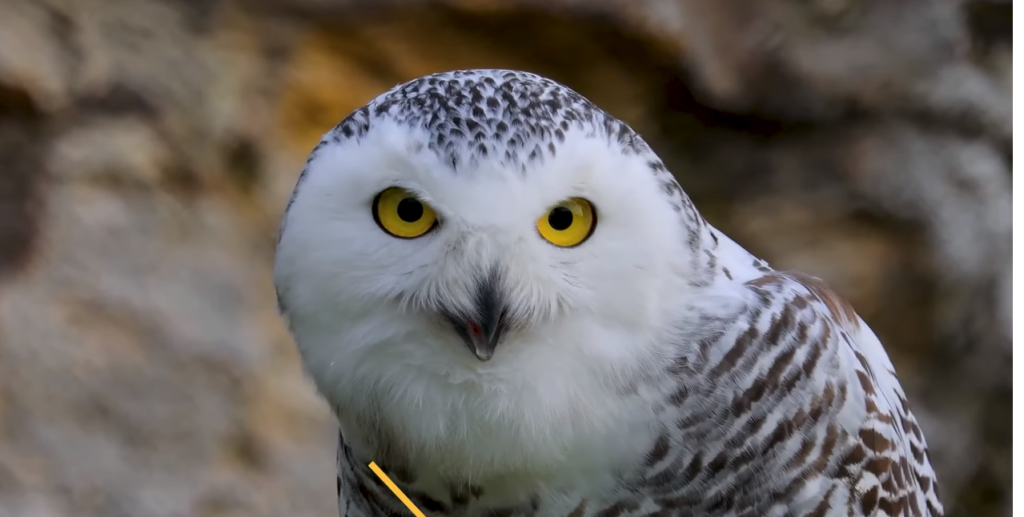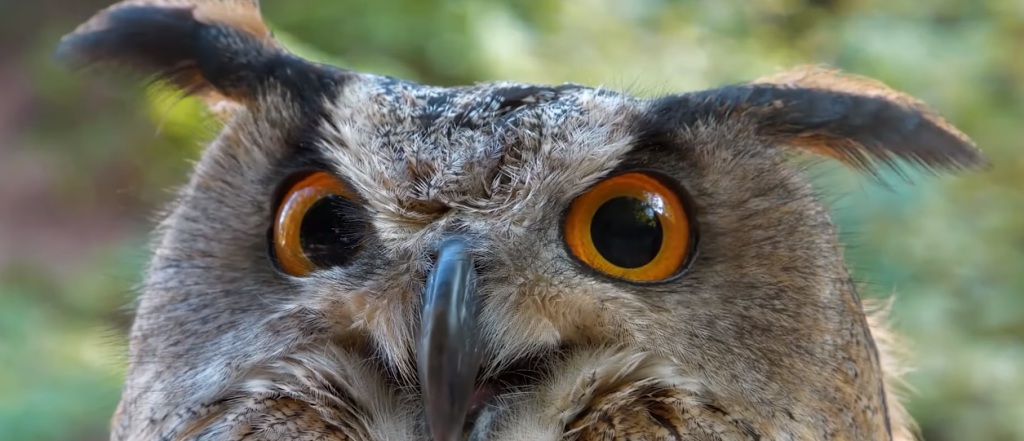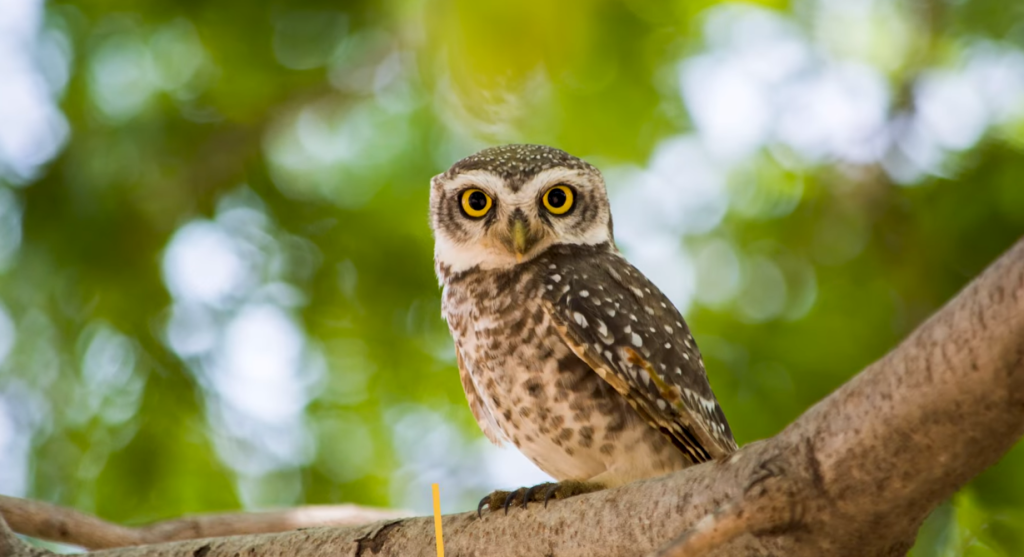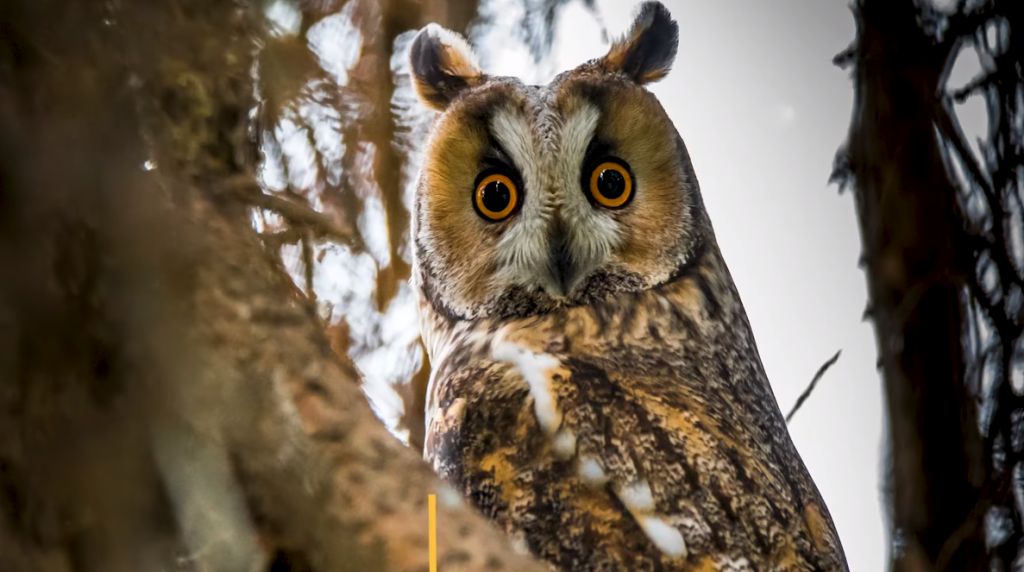Are owls intelligent? This question has intrigued scientists and nature enthusiasts for years.
So, Owls are in real not “smart,” or intelligent at least when we talk about most intelligent members of the avian community including many parrots , crows and others.
Owls are known for their exceptional hunting abilities, keen senses, and impressive adaptability to various habitats.
In fact, many owl species have been observed demonstrating problem-solving skills and complex behaviors that suggest a high level of intelligence.
In this blog post we will delve deeper into the fascinating world of these nocturnal creatures to uncover just how intelligent they truly are.
Are Owls Intelligent?
Owls are generally not considered to be as intelligent as some other bird species, such as corvids (crows, ravens, magpies, etc.) and parrots. However, owls are still very intelligent animals.
They are able to learn and remember complex tasks, and they can solve problems.
Here are some examples of owl intelligence:
- Owls can learn to recognize individual humans and other animals.
- Owls can learn to solve problems, such as how to open a box to get to food.
- Owls can learn to mimic sounds, such as human voices or the calls of other animals.
- Owls can use tools, such as sticks or bones, to help them hunt or forage for food.
While owls may not be as intelligent as some other bird species, they are still very intelligent animals.
They are able to learn and remember complex tasks, and they can solve problems. This intelligence helps them to survive in the wild and to be successful predators.
Owl Anatomy and Physical Characteristics
Owls are fascinating creatures with unique anatomical features that contribute to their hunting prowess. Here are some key physical characteristics of owls:
Feathers: Owls have specialized feathers that enable silent flight, allowing them to approach prey undetected. These feathers have fringed edges that help reduce noise from air turbulence.
Facial Disc: One distinctive feature of owls is their facial disc, a concave arrangement of feathers surrounding the eyes. This disc helps direct sound towards the ears, enhancing their exceptional hearing abilities.
Eyes: Owls possess large forward-facing eyes, providing them with binocular vision and excellent depth perception. Their eyes are fixed in place within bony eye sockets, limiting mobility but increasing focus.
Nocturnal Adaptations: Owls are primarily nocturnal hunters, so they have evolved several adaptations for night-time activities:
- Enhanced Low-light Vision: They have more rod cells in their retinas than humans do, enabling better vision in dim light conditions.
- Tapetum Lucidum: A reflective layer behind the retina enhances sensitivity by reflecting incoming light back through the photoreceptor cells.
- Large Pupils: Their pupils can dilate widely to capture as much available light as possible.
Talons: Owls possess powerful talons on their feet designed for grasping and killing prey swiftly and efficiently. These sharp claws allow them to catch a wide range of animals varying in size from insects to small mammals.
Beak Shape: The shape of an owl’s beak varies depending on its diet niche:
Hooked Beak: Species like eagle-owls or great horned owls possess curved beaks suited for tearing flesh.
Sharp Pointed Beak: Barn owls feature long pointed beaks ideal for capturing small mammals.
Is Owl the Most Intelligent Animal?
No, owls are not the most intelligent animals. The most intelligent animals are generally considered to be corvids (crows, ravens, magpies, etc.) and parrots.

These animals have larger brains relative to their body size than owls, and they have been shown to be capable of complex problem-solving and tool use.
Owls are still very intelligent animals, but they are not at the top of the intelligence scale. They are able to learn and remember complex tasks, and they can solve problems.
Do Owls Have a Good Memory?
Owls are generally considered to have good short-term memory. They can remember the location of food sources and the calls of their prey. However, their long-term memory is not as well-developed.
Owls have a large hippocampus, which is the part of the brain responsible for short-term memory. This allows them to remember information for a short period of time, which is important for hunting and finding food.
Why Owl Is a Symbol of Intelligence?
Owls are often seen as symbols of wisdom and intelligence in many cultures around the world.
This is likely due to a number of factors, including their large eyes, their ability to see in the dark, and their silent flight.
Owls have large eyes that are very good at seeing in low light conditions. This makes them well-suited for hunting at night, when most other animals are asleep.

Their large eyes also give them a wide field of vision, which allows them to see their prey from a distance.
Owls are also able to fly silently, which makes them even more effective hunters. This is because their feathers are designed to absorb sound, so they can sneak up on their prey without being detected.
Do Owls Represent Truth?
Owls are often seen as symbols of wisdom and truth in many cultures around the world. This is likely due to a number of factors, including their large eyes, their ability to see in the dark, and their silent flight.
Owls have large eyes that are very good at seeing in low light conditions. This makes them well-suited for hunting at night, when most other animals are asleep.
Is It Good Luck to See an Owl?
Whether or not it is good luck to see an owl depends on your culture and beliefs.
In some cultures, owls are seen as symbols of wisdom and good luck, while in others they are seen as omens of bad luck or death.

Here are some examples of how owls are seen as symbols of good luck in different cultures:
- In Native American cultures, owls are often seen as symbols of wisdom and knowledge. Owls are often seen as messengers from the spirit world, and they are said to be able to see the truth that is hidden from others.
- In Chinese culture, owls are seen as symbols of longevity and wisdom. Owls are often depicted as symbols of good luck and fortune, and they are said to bring wisdom and knowledge to those who see them.
- In Japanese culture, owls are seen as symbols of good luck and fortune. Owls are often depicted as symbols of wisdom and knowledge, and they are said to bring good luck to those who see them.
What Factors Contribute to An Owl’s Intelligence?
There are many factors that contribute to an owl’s intelligence. Some of the most important factors include:
How Does an Owl’s Intelligence Help It Survive in The Wild?
Owls are very intelligent animals, and their intelligence helps them to survive in the wild in a number of ways.
- Hunting: Owls are nocturnal predators, and they use their intelligence to hunt in the dark. They have excellent eyesight and hearing, and they are able to track their prey even in low light conditions. They also have a good understanding of the environment, and they are able to use this knowledge to their advantage when hunting.
- Finding food: Owls need to eat a lot of food to survive, and they use their intelligence to find food sources. They have a good memory for the location of food sources, and they are able to learn new food sources quickly. They are also able to use their problem-solving skills to find food in difficult situations, such as when food is scarce.
- Avoiding predators: Owls are preyed upon by other animals, such as hawks and foxes. They use their intelligence to avoid predators by being aware of their surroundings and by using their camouflage to blend in with their environment. They are also able to fly silently, which makes it difficult for predators to hear them coming.
- Socializing: Owls are social animals, and they use their intelligence to communicate with each other. They have a variety of vocalizations that they use to communicate with each other, and they are also able to use body language and facial expressions. This communication helps them to stay in touch with each other and to coordinate their activities.
- Raising young: Owls are very good parents, and they use their intelligence to raise their young. They are able to teach their young how to hunt and how to survive in the wild. They are also able to provide their young with the food and shelter that they need to grow and thrive.
Understanding Owl Behavior
Owls are fascinating creatures with unique behaviors that contribute to their reputation as intelligent animals.

By observing and studying owl behavior, researchers have gained valuable insights into their hunting strategies, communication methods, and social interactions. Here are some key aspects of owl behavior:
1. Nocturnal Predators: Owls are primarily nocturnal hunters, meaning they are most active during the night. Their exceptional night vision allows them to spot prey in low-light conditions.
2. Silent Flight: One remarkable feature of owls is their ability to fly silently. Specialized feathers with fringed edges reduce turbulence and noise, enabling them to approach prey without being detected.
3. Hunting Techniques: Owls employ various hunting techniques depending on their species and habitat. Some species perch on elevated locations before swooping down onto unsuspecting prey, while others actively search for food while flying.
4. Diverse Diet: Owls have a diverse diet that varies based on their location and available food sources. Most owls feed on small mammals like rodents but also consume birds, amphibians, reptiles, insects, and even fish.
5. Territorial Behavior: Many owl species exhibit territorial behavior by defending a specific area from intruders or rival individuals of the same species through vocalizations or physical confrontations.
6. Parental Care: Owls display strong parental care towards their offspring by providing protection and nourishment until they become independent hunters themselves.
7. Communication Methods:: While owls may be renowned for their hooting sounds associated with nighttime ambiance, they use various vocalizations such as screeches or whistles to communicate with other owls in mating rituals or territorial disputes.
8. Adaptation Strategies:: Owls possess incredible adaptability traits that allow them to thrive in different environments worldwide from deserts to forests due to specialized adaptations like camouflage plumage and the ability to rotate their heads up to 270 degrees.
Comparing Owl Intelligence to Other Birds
When it comes to intelligence, owls are often regarded as highly intelligent birds. However, how do they compare to other bird species? Let’s take a closer look at some key factors:
- Brain Size: Owls have relatively large brains compared to their body size, which is an indicator of higher intelligence in birds.
- Problem-Solving Skills: Owls demonstrate impressive problem-solving abilities. They have been observed using tools and strategies to obtain food or overcome obstacles.
- Memory: Owls possess excellent memory skills, allowing them to remember hunting grounds and nesting sites over long periods.
- Learning Capacity: These nocturnal creatures are known for their ability to learn quickly from experience and adapt their behavior accordingly.
- Communication Skills: While not as vocal as some bird species, owls use a variety of hoots, screeches, and calls for communication purposes such as mating rituals or territorial displays.
- Hunting Techniques: Owls employ various hunting techniques depending on the prey they target – from silent flight to precise swoops – showcasing their exceptional predatory instincts.
- Social Behavior: Unlike many other bird species that exhibit flocking behavior, most owl species prefer solitary lifestyles but still maintain strong pair bonds during the breeding season.
In comparison with other birds:
- Parrots: Known for their mimicry skills and complex social interactions.
- Crows: Recognized for their problem-solving capabilities and tool usage.
- Falcons: Renowned for their speed during aerial pursuits.
- Pigeons: Display remarkable navigational abilities utilizing magnetic fields.
Watch Video: Are Owls Intelligent?
Conclusion! Are Owls Intelligent?
Owls are indeed intelligent creatures. Through their exceptional hunting skills and complex social behaviors, they have proven themselves to be highly adaptive and capable of making strategic decisions in various situations.
Their ability to navigate through darkness using specialized vision and acute hearing adds further evidence to their intelligence.
Their keen memory allows them to remember hunting grounds and recognize familiar faces among their own species.
Overall, the intelligence of owls cannot be denied. These magnificent birds continue to fascinate scientists with their unique capabilities and astute behavior patterns.
FAQs
How Intelligent Are Owls Compared to Other Animals?
Owls are generally considered to be more intelligent than other birds, but they are not as intelligent as some other animals, such as corvids (crows, ravens, magpies, etc.) and parrots.
Corvids and parrots have larger brains relative to their body size than owls, and they have been shown to be capable of complex problem-solving and tool use.
What Are Some Examples of Owl Intelligence?
Owls are able to learn and remember complex tasks, such as how to open a box to get to food.
They can also solve problems, such as how to catch prey that is out of reach.
Owls can also learn to mimic sounds, such as human voices or the calls of other animals.
What Are Some Misconceptions About Owl Intelligence?
Owls are not as intelligent as other animals. While owls are not as intelligent as some other animals, such as corvids and parrots, they are still considered to be intelligent animals.
Owls are only intelligent when it comes to hunting. Owls are intelligent in a variety of ways, including hunting, finding food, avoiding predators, socializing, and raising young.




